#y1s1
Text
🕷 spider diagrams 🕷

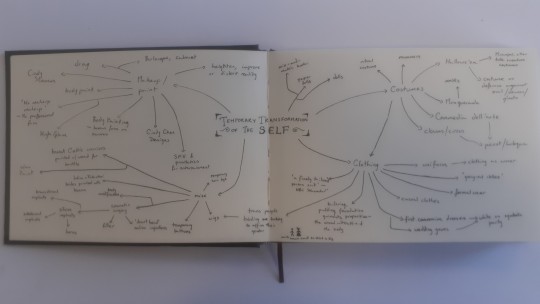
two mind maps or 'spider diagrams' on the prompt "temporary" 04–05/10/2022
Starting from the prompt, I have narrowed my focus slightly to explore "temporary transformation of the self". For me this strikes a comfortable balance between specificity and freedom, and gives me capacity to follow the prompt into further specifics as my exploration continues
18 notes
·
View notes
Photo

Finally Kay arrived to her uncles house. At least she was sure this was her uncles house. She pulled her map out to look at the address and sure enough she had the right place.
2 notes
·
View notes
Text
regisering for classes is kind of fun tho i like seeing all the abbreviations and timetables i made a spreadsheet of my y1s1 timetable its fun
2 notes
·
View notes
Text
NTU Sociology module reviews: HS1001, HS1002, HS1003
Note: I took these modules in AY22/23, there is a chance that things have since changed.
(Ctrl+F to skip to the mods you’re looking for :-D)
HS1001 Person and Society
Course Type: Major Core, 3AU
Course Coordinator/ lecturer: Associate Professor Shirly Sun
When I took it: Y1S1, AY2022-2023
Assessment structure:
Class participation - 10%
Group in-tutorial presentation - 20%
Term paper - 30% (Due: Week 13)
Finals (essay-based) - 40%
TL;DR:
Not hard, not easy. Attending lectures is important. Readings can be overwhelming, don't waste too much time on the longer, traditional texts; skim those readings for key concepts and useful case studies which will come in handy for finals. For the presentations, be concise. For the term paper, do A LOT of research and planning.
What is this mod about?
This module is an introduction to Sociology. Accordingly, it goes through Sociology’s basic concepts, the major schools of thought/ theories in the field, and some of the major social phenomena that shape our lives today.
Overall,
This module is relatively manageable and really quite interesting. The main concepts across the mod are not hard to grasp. This is mainly because the module's textbook, The Practical Skeptic (McIntyre, Lisa. 2020) is very accessible for people with no background knowledge.
Attending lectures is important:
They go through useful concepts that are not really covered elsewhere in the course and the lecture slides alone are not sufficient to fully understand what was taught in lecture.
There were a number of documentary screenings during lectures over the sem. Info from the documentaries will be useful for finals, attending lectures will let you know which parts of the documentaries you need to pay attention to.
Prof Shirly is very kind.
Tutorials and tutorial presentations:
Courtesy of the wonderful graduate TA that helmed tutorials when I took this mod (Ms. Raksha Kirpal Mahtani), tutorials were, at once, productive and low-pressure.
Tutorial presentations: Most sociology mods seem to have a tutorial presentation component. At the beginning of the semester, students will be assigned to a particular week and they would then have to prepare a presentation (and usually facilitate discussion for) the week’s readings. Here, being concise is key, do not be afraid to cut out large parts of the readings for your presentation.
Though, the readings outside the textbook can be overwhelming:
There are a few readings from the ~19th Century that can be tricky to navigate (vis-à-vis old fashioned academic language). These are classic works in sociology by the field's founding fathers (Marx, Weber, Durkheim). But, fret not, the concepts covered in these readings are also covered in the textbook in a more digestible form. So, do not make the mistake of spending too much time deciphering these classic readings.
And there are a few other quite lengthy, info-overload papers. Be selective in identifying which parts to pay attention to and which parts to skim over.
Term paper:
Involved writing about a social issue of your choice that fell into one of 3 broad categories (racial profiling, gender discrimination or class inequality).
This will probably be one of sociology students' first experiences with academic writing. Don't be too intimidated, the syllabus lays out a clear structure to follow in writing this paper.
I intend on writing a more comprehensive guide to academic writing but for now, to do well for this essay, I suggest you do a lot of research on your chosen issue and the sociological concepts you intend on using in the paper (and make a plan before you start writing!).
Finals (essay-based):
Even though the content was relatively easy to understand, there was a lot of it.
Understanding the broad concepts and processes in the mod is, of course, the most important thing to do.
Secondary to that is cherry picking case studies/examples from the readings to supplement your answers.
HS1002 Singapore Society in Transition
Course Type: Major Prescribed Elective (compulsory), 3AU
Course Coordinator, Lecturer: Assistant Prof Ye Junjia
When I took it: Y1S1, AY2022-2023
Assessment structure:
Class participation - 15%
Group in-tutorial presentation - 15%
Term paper - 30% (Due: Week 7)
Finals (essay-based) - 40%
TL;DR: Again, not hard, not easy and attending lectures is important. For tutorial presentations, focus on facilitating discussion rather than summarising content. Don’t be intimidated by the term paper, as long as you nail the basic elements of a paper, you can do well. For finals, keep in mind the main theme of the course ‘transition’
What is this mod about?
This mod is a sociological overview of Singapore: its history, how it is today, and how it might be in the future. Specifically, the mod explores how SG has been governed and how that has shaped its society. Some topics include: gender & family; race & ethnicity; public space; civil society; migration.
Once again, attending lectures is important:
I found that lectures went through the core, most important ideas which were supplemented by the readings. Lecture content gives you the necessary framework to understand the readings and clues you in as to which parts of the readings are most important
Also, the lecture slides are pretty bare bones. They won’t be too useful to you if you don’t attend the lecture.
Readings:
Compared to HS1001, I found that HS1002 had a heavier reading load. Though, most of them are easy enough to grasp.
Again, readings will provide you with a lot of supplemental information; do not attempt to memorise everything, pick out several key examples when studying for finals.
Some readings will introduce other concepts that weren’t really covered in lectures. In my experience, I don’t think that these are too important, I think that you can do well in finals without them. Instead, use the readings to build on the core ideas from lectures.
Tutorials and tutorial presentations:
Tutorials revolved around student presentations. In my tutorial group, we didn’t do anything other than listen to student presentations and engage with their discussion questions
Prof Jia emphasised that the presentations should mainly be about on facilitating discussion (as opposed to being a regurgitation of the readings by students). However, it played out very differently in my tutorial group. The presentations essentially became ~30 min lectures with some breaks for discussion questions. I think what happened was: early presenters focused on regurgitating content and everybody else was subsequently pressured into doing the same. As a result, the presentation became a rather demanding.
That said, I think that essentialising your presentation’s content and focusing on facilitating discussion (via discussion questions, debates, Kahoot, etc) is for the best, even if everyone else seems to be doing presentations deep diving into the readings. Your presentation will be far more engaging and a lot less onerous to prepare for.
Term paper:
HS1002′s term paper was due mid-semester, which is a bit out of the ordinary but not a bad thing, you’ll likely be juggling several other deadlines towards the end of the semester. So, this paper was the very first experience with academic writing for many soci Year 1s.
Accordingly, there was an (ungraded) abstract that you had to submit before the paper. This was probably just for the TAs to make sure you were on the right track. This is a good opportunity to get some feedback on your paper so take this seriously, even though it is ungraded.
The topic for the paper is very broad -- any issue related to Singapore, essentially. This meant that I had difficulty deciding on a topic/research question. My advice: don’t waste too much time trying to think of a unique or impressive area of study, it’s fine to write about a generic topic.
Also, given that almost everyone will be new to academic writing, it won’t be hard to do well in this paper. Getting the baiscs of writing a paper correct will be enough for a good grade (i.e. Organised structure; a research question/argument; coherent writing; proper citating and formatting).
Finals:
Take direction from the core concepts from lectures in your revision. Do not blindly memorise content from the readings.
Do not study the weekly topics in isolation, think about how they interact. This will be crucial for finals. And relatedly, think about the main theme of the course ‘Singapore society in TRANSITION’ -- how has society transitioned/changed?
I found it helpful to put together a short timeline of major developments in SG’s history with info from lectures and various readings.
Dust off your exam taking skills and try to craft some essay questions and attempt to answer them.
Some thoughts from myself:
I really enjoyed this mod. Not only is Prof Jia a wonderfully engaging speaker, the content content of the mod was very eye opening; it called into question a lot of the taken-for-granted beliefs that we might have about SG. I feel like I have a more holistic understanding of SG society now.
HS1003 Social problems in a global context
Course Type: Major Prescribed Elective, 3AU
Course Coordinator, Lecturer: Assoc. Professor Sulfikar Amir
When I took it: Y1S2, AY2022-2023
Assessment structure:
Class participation - 10%
Group in-tutorial presentation - 20%
Term paper - 30% (Due: Week 13)
Finals (essay-based) - 40%
TL;DR: The presentation/essay assignments were pretty demanding (if you wanted to do well, anyway). The mod’s content is not difficult to comprehend, finals were relatively manageable. The topics from the first few weeks are especially important. If you’re aiming for an A+, thorough knowledge of the readings is necessary, with regards to finals. Otherwise, understanding lecture content, its broad concepts, is all you need to do decently for finals.
What is this mod about?
Contemporary globalisation is the central theme in this mod. Each week typically looks at a set of social problems and how they relate to/are created by globalisation. Some topics include: crime; poverty and inequality; technology; war.
Lectures
And once again, attending lectures is important. But probably more important for this mod than others. Prof Amir has a few ‘whiteboard style’ lectures. That is to say, a lecture comprised of mostly verbal communication and some mind-mapping-type drawing on the whiteboards with very minimal slides. You will be completely lost without attending lectures.
The first few topics covered in the mod are particularly important.
They are broad, foundational concepts that are the mainstays of the rest of the mod’s content (e.g. social structures, global division of labor, neoliberalism). So, make sure to establish a strong understanding of these topics early on. These should be the first topics you revise in your preparation for finals.
Readings and finals
With the exception of the first few weeks of content, the readings didn’t seem to be too important in the rest of the mod. However, I was rather blindsided during finals for this mod. without revealing too many details, the exam questions made explicit reference to several readings. This was surprising because we never really went through any of that in lecture or tutorial. Had I known that, I would’ve studied the readings in greater depth.
Tutorials
I just want to say that the TA for my batch was so incredible in all respects. (Thanks for everything, Ming Wei!)
Tutorial presentations and the social problems essay
These are individual and connected assignments. In the presentation, we had to go through the outline of our essays, answer questions from the audience and receive feedback. Like the other mods, we were assigned a topic at the beginning of the semester and had to present and write our essays about the assigned topic.
There is a fairly set structure to the essay: describe your chosen problem, explain the problem with sociological concepts/theories, and link it all back to globalisation. The tricky part of this essay is weaving these 3 parts into a seamless, coherent argument (and you do, in fact, need to have an argument; your essay cannot simply be a description of a social problem)
My advice: read widely in search of the sociological concept(s) you choose to use in your essay; a very common mistake people made was to invoke ‘cOnFliCT thEoRY’ which is probably better described as an overarching paradigm in sociology rather than a theory.
Regarding the presentation, I can’t speak for future batches, this might depend on your TA, but in my experience, presentation skills did not seem to matter as much as the content of your presentation. It was alright to read off a script, to have not-so-pretty slides.
More importantly, the presentation is a fantastic opportunity to get feedback on your essay. So, even if you were unlucky enough to be assigned a week 3 presentation slot, take this very seriously.
On a final note, this presentation and essay were the most difficult and demanding assignments I did that semester. Though, they were also the most rewarding. I’m quite proud of the essay I ultimately produced and I think the process of researching for and writing this essay really upgraded my writing skills.
2 notes
·
View notes
Note
I meant freshman and sophomore in college. do grades not work like that in college/University where you're from? Wasn't trying to say you're underaged, sorry 😅
Ahh then clearly the systems work differently around the world oops! And nah we don't even say highschool or college here, just grades.
Like typically gr6-8 is middle school, gr9-10 is highschool, gr11-12 is college. Then in university we just go by Y1S1 (year 1, semester 1)
4 notes
·
View notes
Text
AY22/23 Semester 1 (Y1S1)
hello! just a brief background regarding this semester, i dropped out of school the week right before finals, as i had been struggling with mental health and ended up hospitalised, hence the reviews of the modules would not be complete ><
my first semester was very stressful and honestly, i was so distracted and overwhelmed that looking back, i did not learn anything at all haha
i had to take an LOA and apply for Special Consideration (SC) for the modules that i did not take the finals for, but the process was rather smooth
but anyways! here's my experience as a Business Analytics student for Y1S1!
modules taken:
CS1010S Programming Methodology
BT1101 Introduction to Business Analytics
MA2001 Linear Algebra I
IS1108 Digital Ethics and Data Privacy
LAK1201 Korean 1
CS1010S Programming Methodology
Professor: Leong Wai Kay
Exams:
28 Sept (Mid-Term)
12 Nov (Practical Exam)
22 Nov (Finals)
Language: Python
Weightage:
Coursemology - 25%
Participation - 5 %
Mid-Term - 15%
Practical Exam - 15%
Finals - 40%
please note that i did not take the finals for this module ><
having no background in coding, this was definitely the killer module as it had the highest workload and toughest concepts to grasp. after every lecture, there would be a lecture quiz regarding what was taught in class, followed by tutorials and missions, and recitations (optional!). in order to secure 25% for Coursemology, we had to reach level 50 by earning XPs through completing tutorials and missions (too much work for me... ).
i would spend my whole day trying to figure out how the code works, find its bugs and generally struggle to keep up. i even ended up having nightmares about coding because of how much time i spend on trying to code.
unfortunately, i did not have the greatest help from my TA and it got really demoralising to the point where i was reluctant to start on any tasks because i knew i would get stuck and spend hours and hours but to no avail.
regarding the weightage for mid-terms and finals, they introduced progressive scoring, where you have a chance to redeem yourself (if you messed up your mid-terms) because your finals results could potentially fully overwrite your mid-terms results.
Prof Leong was pretty chill, i would say. i was not exactly able to always catch up with his content but there were online videos to refer to, so probably not that big of a problem.
Note:
Be prepared for the intensity of this module
Cheatsheets are allowed
Mid-terms was conducted in pen and paper
BT1101 Introduction to Business Analytics
Professor: Sharon Tan, Zhai Yingda
Exams:
18 Oct (Mid-Terms)
24 Nov (Finals)
Language: R
Weightage:
Online Quiz & Datacamp Assignments - 15%
Tutorials (best 6 out of 9) - 24%
Lab - 6%
Mid-Terms - 15%
Finals - 40%
please note that i did not take the finals for this module ><
the module is split equally by the two Professors, with Sharon teaching the first half of the semester and Zhai teaching the second half of the semester.
the general workload of each week includes watching lectures and completing online self-learning activities, completing tutorials and lab sessions. it was still manageable, though R can be quite confusing as it is not very intuitive for me.
for tutorials, they do not really provide you with the model answers so you cannot exactly refer to the codes to do your assignments... but other than that, i do not really have any comments regarding this module.
regarding the mid-terms, it was held online on Examplify where there will be no access to the internet. it was a combination of MCQs and long answer questions where you will have to provide your own code as the solution.
Note:
Cheatsheets are allowed
Would recommend you to build your own code bank for reference during exams
MA2001 Linear Algebra I
Professor: Dilip Raghavan, Ma Siu Lun
Exams:
23 Nov (Finals)
Weightage:
Online Quiz - 15%
Homework Assignments - 20%
Lab - 5%
Finals - 60%
please note that i did not take the finals for this module ><
this module was more of H2 Further Mathematics, so if you have experience in that, good for you. we were learning about matrices but on steroids.
the general workload for each week includes watching lectures, completing tutorials and occasionally assignments. lectures are all recorded (thank god), and you can pretty much self study for it.
everyone basically got full marks for online quiz, homework assignments and lab because there was a Telegram chat where everyone would discuss answers and learn from each other. the killer questions were proving, and that would pretty much be the separation between the As and Bs.
i freaking loved Professor Chan Heng Huat's teaching and he was very passionate about teaching the subject. i attended his tutorials and every session was just like WOWWWW (but i still struggled a lot haha).
Note:
Cheatsheets are allowed
IS1108 Digital Ethics and Data Privacy
Professor: Lee Boon Kee
Weightage:
Tutorial Attendance - 10%
Case Scenario - 20%
Quiz - 30%
Reflections - 10%
Project - 30%
at the end of the course, i do not think that i have learnt anything new or useful. this module is basically fluff and actually reminded me of PW in JC. did not watch any lectures and still managed to get a good grade.
tutorials were 2 hours long to analyse case scenarios based on a given framework and give a short presentation to the class. the TAs will then give feedback based on the presentation.
as for the final project, just treat it as another PW - look for problems, analyse stakeholders, provide solutions, evaluate pros and cons. as long as people in the group pulled their weight, it should be fine. if not, i guess you just gotta suck thumb.
Note:
Take it with your friends
LAK1201 Korean 1
Professor: Bae So Hee
Weightages:
Quiz - 10%
Written Test - 50%
Oral Test - 15%
Writing Assignment - 15%
Participation - 10%
Exams:
24 Aug (Online Quiz)
31 Aug (Online Quiz)
15 Sept (Mid-Terms)
27 Oct (Oral)
8 Nov (Finals)
i took this module just to spoil market because i already kinda knew how to read and write korean letters so i did not think that i needed to put in much effort to do well. i got complacent and realised (late) that everyone had the same thinking...
learning a new language is always hard but i guess having the face to face tutorials help as it provides a space where everyone is able to learn how to speak the language. but languages being languages, i got very confused with how the grammar works, sentence structures etc.
in general, it was a pretty fun and interesting module and we even learnt how to fold a hanbok for our last session! would recommend this module if you are interested in Korean!
Final Thoughts
it was definitely a shame that i only dropped out the week before finals, but looking back, it was necessary because i knew that i could not perform up to my standards and would be disappointed in my results. it was a leap of faith to take up the LOA and further take a gap semester to heal, and i am glad that i took that step. there were many considerations -- forfeiting the school fees for the semester, lagging behind my peers, explaining to my peers regarding my mental health.
if you are struggling with your mental health, please do not push yourself too hard. if you need a break, please take one.
i hope that this would provide some insights to the life of an average BZA student :)
peace <3
1 note
·
View note
Photo
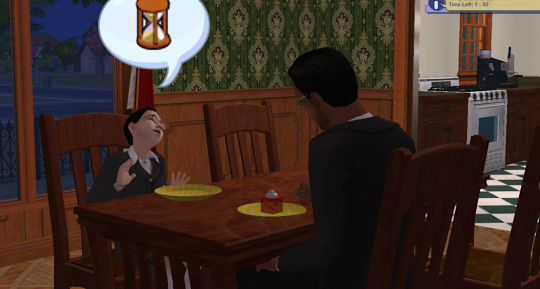


Party Shenanigans:
Alexander telling Darren about his upcoming birthday next season and Don playing with Alexander’s doll house? I don’t know how this is even possible, maybe a trait related mod?
#the sims 2#pleasantview with a twist#pvwt#pvwt: alexander goth#pvwt: don lothario#pvwt: darren dreamer#year 1#summer#y1s1
9 notes
·
View notes
Photo


Happy Thanksgiving
87 notes
·
View notes
Photo

[Design Fundamentals] [Y1S1] The tools I used for this piece were pencils, a compass, rulers, artline markers and of course a cutter. We were required to create a maximalist piece on a pop up card. My strength was in pens, not paint, and thus I decided to go for a black and white piece.

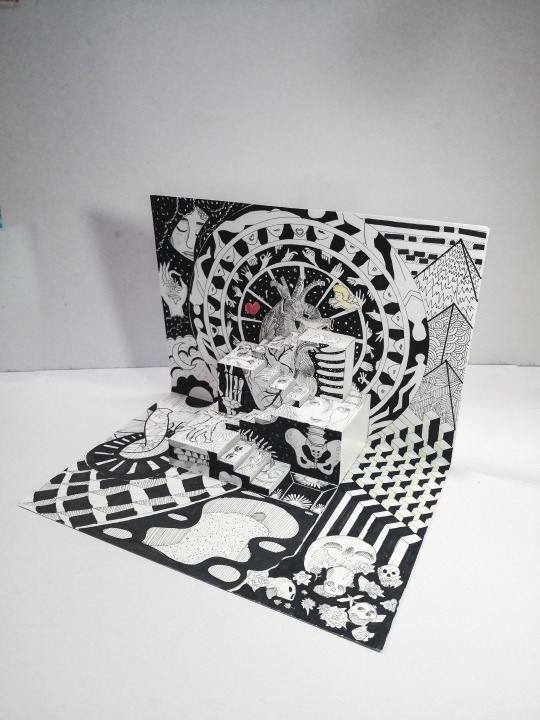
11 notes
·
View notes
Text

Masquerade - Digital Painting 27/11/2022
I wanted to do some digital art for this brief, and while my preference is to take longer with pieces (I have in the past made intricately detailed digital illustrations over the course of a week or more totaling 24 hours of work), I just did a quick piece here. Using the same reference photo as my charcoal sketch I spent an hour and three quarters on this. Some elements, like the hands, are still very rough. Since hands are difficult for me and I have no desire to spend another hour on this piece I am alright with leaving them as they are.
The colouring on the mask, and the faint sepia tint to the rest of the piece, is due to the use of gradient maps. I think they're a great tool, though I am not nearly so skilled in using them as illustrator Marlowe Lune. I like how the colour changes the piece--now the mask catches attention with its magenta-and-blue, but the strongest contrasts in the piece are around the eye. It would look better if further refined, though. Hm.
I was thinking about trauma while making this piece, but looking at the finished (?) illustration I think it is more effective in the context of masking and performative emoting. Showing pleasant emotions when that isn't how you feel, or putting a smile on when you naturally have a flat affect. You cannot simply exist--you must be bright and pleasing and interesting, and if that doesn't come naturally then you must spend all your time holding up a mask.
or something, anyway.
Clip Studio has a timelapse function, so I have exported the 1 hour 45 minute process into a 60 second clip.
12 notes
·
View notes
Photo

While he was waiting for his niece some people from the town stopped by. Apparently the nearest town was 20 miles away but when they heard of the new sims moving in they loaded up to come say hi.
4 notes
·
View notes
Photo

𝐀𝐒𝐒𝐈𝐆𝐍𝐌𝐄𝐍𝐓 𝐈𝐈𝐈
—𝟜/𝟙𝟘
5 notes
·
View notes
Text
AY2019/2020 Y1S1 Module Review
AY2019/2020 year 1 semester 1 review
Started school around august after orientation camp in july, and had to study after doing nothing for months after a levels and finally had the taste of the rigour of this major.. semester 1 went by too quickly..
Modules taken this semester:
CS1010S
MA1101R
MA1521
BT1101
GER1000
CS1010S Programming Methodology (Python)
Prof: Ben Leong
Exam Dates: 2 Oct (Midterm) / 16 Nov (Practical Exam) / 27 Nov (Finals)
Weightage:
Coursemology – 25% (25%)
Participation – 5% (5%)
Midterm test – 15% (-)
Practical exam – 15% (20%)
Final assessment – 40% (50%)
(those in brackets are for those taking alternative final)
S in CS1010S is for science students, most students are either science students (DSA/ Life Science plenty) or BZA students.
Overall this module easily had the highest workload compared to other modules, having to rush missions every week, complete tutorials (this is pretty standard duh) and lecture trainings before deadlines for bonus points on a gamified platform. One could sit at their table wracking their brains for the whole day and still not be able to come up with a feasible code, or have their codes stuck with some bugs and not knowing how to continue. Really, without the help from fellow friends this module would be hard to get through. Luckily my TA was kind (and patient!) enough to explain such that my brain could get it. Ended up having to IP this module sadly… This module really requires your wholehearted devotion and really tests your patience i must say, especially for people who are not too intellectually inclined (aka me)..
They introduced a new scheme this semester aka Alternative Final, meaning you get to retake your midterm and finals by tabao-ing it into the next sem except you do your finals during the recess week instead of the finals, kinda like a half-retaking a module? Your grades for finals are IP-ed (in progress) rather than letter grades and the finals and midterms will be accounted for in the following half a semester albeit under different weightage components.
They said its a introductory module, but …………..
This year’s practical exam was particularly hard i think i had friends (even the zai ones) getting single digit marks… banked full in on the Method of Life question (Q5) of finals which is a giveaway question asking you how you can apply the concepts to other parts of your life and your main take-aways from taking this module (filled up the whole page and got full marks for it 4m) without this question i would have failed the paper..
Now i have to work hard the next sem… its kinda sad for us BZA students because CS1010S is a prerequisite for those wanting to take BT2101 and CS2030/2040 modules in the following semester (y1s2). Future students (esp BZA) please take the advice to consider this when deciding whether to IP…. because guess who didnt and regretted not thinking deeper…..
Ah one more thing to take note is the weightage is quite different for those IP/ alternative final people, theres higher weightage for the papers :_D
Ben Leong is a pretty good lecturer, hes solid in delivering concepts except my brain may be a little too slow for him.. Theres also lecture videos online that you can refer to and thousands of papers (with solutions!!) waiting for you to do.. something uncommon for many modules i heard? also, you get to see your final (scanned) paper through a website, in ben leong’s words “how cool is that?” he also uploads the mark scheme for your reference which is pretty cool imo. He’s a very interesting lecturer.
MA1521 Calculus for Computing
Prof: Leung Pui Fai
Exams: No midterms, just an online quiz (4 questions, most get full marks for), and the finals
Weightage: cant really rmb the weightage but i think its 40-60? i think tutorial attendance isnt graded..
They said this was just a repeat of H2 maths with more stuffs well boy i must say this wasnt as easy as they said.. okay maybe for me, ive always struggled with maths for a really long time. Surprisingly got a B for H2 Maths, i got a B3 for O levels really the blemish in my results. Got a B- for this module. Many people will say this is an easy module, you can trust them a little different in my shoes i guess. I didnt turn up for lectures for the half part of the semester since he talks a bit too slowly so i just watch the webcast sped up. But being a procrastinator i’m really behind on webcasts by the time the exams came.. i think i spent too much time on CS1010S and its still not enough.. if you dont have the discipline to watch them religiously at home, i would suggest you go for the lecture even though he may talk abit slowly but it forces you to not miss out on them. I dont really had the time (is it i wonder?) to do the tutorials either so i was also behind on them.. most of the time i just sat for tutorials and took the answers down to only work on them many weeks later (much regrets) so i didnt really understood what was going on as the TA went through. please dont be like me… the recess week was for sure not enough to revise/ learn all the content for all your mods for both midterms/finals so please dont be lazy like me…. this is the suffering i brought upon myself TT
Overall i think. it is not that hard a mod if you do your work consistently.. things got a little confusing towards the end i heard they dropped a whole chapter this semester glad they did.
MA1101R Linear Algebra I
Prof: Wang Fei
Weightage:
Finals (28 Nov, 2h)— 60%.
Mid-term test (4 Oct, 2h)— 20%.
3 homework assignments (4% per assignment) — 12%.
An in-class Lab (MATLAB) quiz — 8%.
This was one of my most hardest period in my life and i say this on PERIODT. As if maths wasnt tough enough, this will really declare a survival of the fittest among your remaining brain cells. Friends told me maths came into their dreams… pls extinguish my soul. You must be thinking i am crazy for wanting to take 2 math mods in a sem right? ?
Yeahh no one really does that but it was my idea because i didnt want to do maths together with all the core core mods (BT and CS) next sem so i decided ah i should just get maths over and done with ( hAH real joke bc i couldnt clear CS1010S and i cant take 2k level mods for BT and CS and unlocked clown outfit because theres one more ST2334 core mod that involves probability and stats so much for thinking i will be over and done with for dealing with maths– someone tell me why did i choose this major again?)
Somehow along the way i realised the bell curve for this was surprisingly high i think those who chose this mod intend to delve even deeper in mathematics, mayhaps i joined the wrong major. The R in MA1101R actually stands for rigorous i didnt realise until my friend read the fine prints in the SOC Course Curriculum for BZA or sumn. Pure hell. There are 3 homework assignments (graded mind you) and most of the students get around 50++/60 i think i was the one of the rare few who flunked quite badly and always eyeballed by my TA (who is a prof for some 3k or 4k level maths, not for this mod though). I approached him for consults and for help and he was nice enough to sit me down and explain slowly. He’s pretty good at explaining slowly although he’s pretty fast in class (and most of the semester i had close to ZERO idea what was going on in class for pretty much most of the mods). Shockingly managed to pull out a C from my butt. The intellect of the students are no joke.. Homework assignments are every 3 weeks starting week 6 i think (so week 6, 9, 12) and i think are there to make sure you catch up with the work.
Oh lectures-wise, i sat for ½ of his classes, i really absorb almost nothing.. the rest of the lecture hall seem to get it though or so it seems. so i stopped attending my own lectures to watch the webcast for Prof Victor Tan too. His webcasts/lectures are really popular and it really owe it to his teaching, apparently he taught Wang Fei before and of course had over ten more years of experience. WF’s lecture turn-outs are comparatively less compared to VT. And on panopto (webcast platform) i think it was almost always 360++ views for VT as compared to a 80++/ was it 30++ for WF if i recall correctly. VT slides are also more concise and simple to understand where as WF’s ones are similar to the textbook. You are also required to purchase a textbook for this module costs around $20 from the co-op store in science and i urge you to purchase it asap when the profs announce they are made available bc they run oos quite fast.. the tutorial questions are from the textbook and the textbook is very simple and straightforward and put together by some of the lecturers/profs in school.
BT1101 Introduction to Business Analytics
Prof: Dr Sharon Tan, Desmond Ong
Weightage:
1. Online Quiz & Datacamp Assignments — 7%
Tutorial 1-4 — 8%
Tutorial 5 onwards — 15%
In-class Assessment (Written) — 10%
Practical Assessment — 20%
Final Assessment — 40%
In class assessment is held 2ish weeks after your midterms week so its kinda like your midterms?
Mm i would say this module is the most ?? its hard to put in words but if you read up the confessions page (NUSwhispers) regularly you would see many complaints that the mod is structured not as neatly as CS1010S its quite here and there everywhere and personal opinion, sometimes i dont know what i am supposed to learn but i guess its like that? The profs seem to value not wanting to spoonfeed and us learning on our own and stuff like that. I heard the mod was much harder in previous years and they simplified it a lot compared to in the past (which i really thank god) but its still a bit ?? They split it into two halves, first half of the sem is taught by Dr ST (Descriptive Analytics) and the next half by DO (Prescriptive and Predictive Analytics).
There are online videos to be watched every week even though you get lectures once every 2 weeks when Dr ST teaches and tutorials to be submitted to your TAs that are graded only after about 6/7 weeks. They leave comments (½ sentences someitmes shorter) and your marks received and thats about all so you dont really know where you went wrong since they are not marked paper and pen way. The tutorials are coding exercises for questions using the R language. They also used Datacamp to drill some of the basics of R for a headstart. Her workshop style lectures are a lot of on the spot learning how to code and stuff which i lag behind a bit because she goes a bit fast in order to cover everything. We learn new content via the online videos that we have to watch every week and theres quizzes for them too weekly iirc.
The next half by DO had no online videos (great!! and no quizzes!!) but weekly lectures and graded tutorials are due every 2 weeks(!!). There are still weekly tutorials but its only graded for every 2nd one, wow this saved me a lot of time phew. I didnt get to do the tutorials for those that are not graded but read through the questions so that i get a gist of whats going on, and somehow i really dont have the time to do it? CS1010S really absorbed a large chunk of my time cries. Finals was a oK it was not that bad i think. There are 20 MCQs and then about 4 structured questions? Closed-book with 1 A4 sheet cheatsheet.
Oh and the bad part about the tutorials are the tutors wont provide you with the model answers/codes so you’re really just on your own. You either get it or nah. :_D
GER1000 Quantitative Reasoning
Weightage:
1. Tutorial — 10%
2. 10 Weekly Quizzes — 20%
3. Project —35% (Presentation 10%, Final Report 25%)
4. Finals (28 MCQs, 2h) — 35%
No lectures so no profs, just weekly online videos and quizzes.
Tutorials are every odd/even weeks depending on the slot you chose.
Groups are arranged by the TAs beforehand.
This was pre-allocated for us so (grits teeth). Honestly a waste of time. One of the mods i neglected till the end to focus on other mods (which was worth it). The workload was manageable, of course (if not how to neglect). Every 2 week you meet together wiht your groupmates to discuss tutorial questions (each group will discuss 1 qn) and every tutorial class ended about 30min earlier. Nearing the end theres a group project report and slides to be done. Report is in the form of QnA so you just answer the questions and slides/ presentation is going through an article of a topic you chose (theres about 10) and you analyse the QR part of it what is good what can be better, etc. Theres also a bit of the stats part with probability and stuff but its a OK. Bell curve steep for finals (40 MCQ, 2h) but most finished in 1h and left the hall, i was one of the few who stayed till the end even though i was just staring at the paper into the depths of my soul for reasons unknown) It’s a lot about experiments not really the scientific/ calculations part of it but understanding about coming up with experiments, the pros and cons of carrying things out a certain way in loose terms something like the art of crafting experiments? makes you think a bit deeper how and what people think and not so dry i guess.
Epilogue
i guess thats a wrap–new semester starts soon :( i think this might be the first module/semester review tumblr blog but i hope this can be of help to anyone, to anyone at all. the owner of many of similar review blogs get really stellar results which i may be too out of league from so i hope this brings comforts to those who are doing not so well and encourage them because im not any different we exist, and we’ll survive.
CARPE DIEM 2020 LETS GEDDIT
0 notes
Text
Rainbow Six: Siege Operations Y1S1-Y3S2



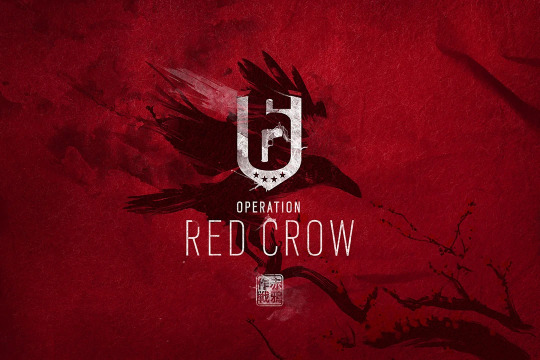


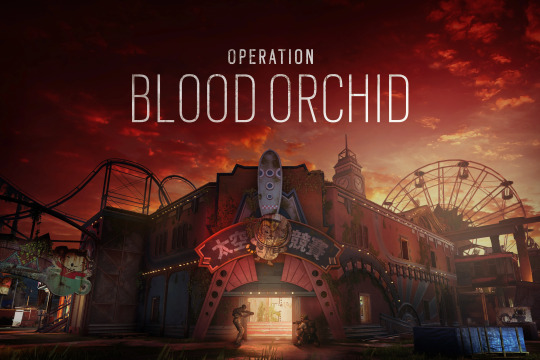

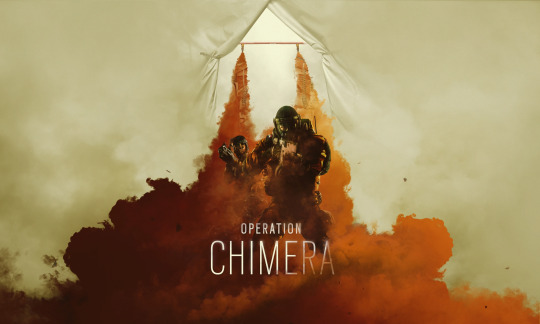
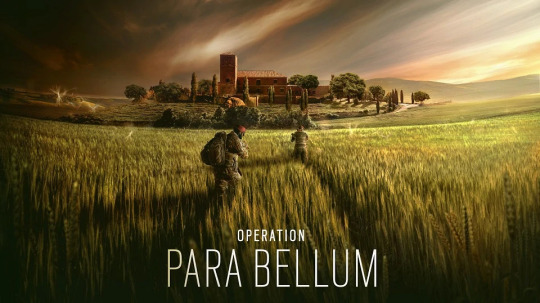
92 notes
·
View notes
Note
hello! its s o cool to watch you go from jc times to now going to grad school! #inspired hahah do you have any tips on getting by uni ? im currently in y1s1 and my gpa is trAsh D:
H ahaha ah I don’t think I’m that inspiring LOL a lot of parents in this country would slap the children if they did what I did and declined top jobs to go to grad school >:D
I used to have trash gpa too, but it got better when I started doing research and realized that it was something I really wanted. I guess it’s about having an aim and a focus that motivates you to study. Also, consistency, I basically didn’t attend class for my first 2 years because I was always in lab, don’t do that, go to class and keep up with your work.
Learn coding! Coding is important for any degree, if you’re in humanities, maybe R, Python or SPSS. If you’re in science, R, Python and Matlab, and for engineering, C, Python and Matlab. As a CFD engineer I’ve also needed to use Fortran and Bash/shell scripting but that’s a specialised field and unlikely that you’ll need to use those. In that regard I’m fortunate that I’ve had years to slowly get comfortable with coding, once you learn one or two languages it’s easy to pick up a third or fourth
#answered#anonymous#uhh if you're my direct uni junior in mech/aero eng... i can send you notes and pyp solutions i guess HAHAHAH but pm me off anon#bev talks
8 notes
·
View notes
Text


04-11-18 (Sunday) //
Found some old notes from last year when I was studying for General Biology 1. Also, I just finished my final exams for degree Y1S1 yesterday! It was quite tough + intense cuz I had to sit for 2 heavy subjects’ papers, which were Human Physiology + Chemistry 1 in one day. Currently, I’m on my sem break now (yaaaaaaaaay). I’ll be back in campus in January + will be posting more before then! :D
#study notes#my notes#notes#studylife#studyign#studystudystudy#study#studytime#study motivation#studyblr#studygram#studyinspo#study blog#biology#universitylife#university#final exams#finals#exam#examination#studyblr motivation#motivation#studyhard#studyweek#studyin space#studyaccount#studyday#studyfulltime#studygirl
934 notes
·
View notes